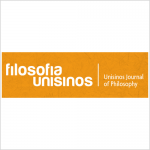Observations on a non-positivistic model of Law's foundation: Dworkin and the idea of “constructive interpretation
Vol 12, No 2 (2011) • Filosofia Unisinos - Unisinos Journal of Philosophy
Autor: Carlos Adriano Ferraz
Resumo:
In a Post-positivist model of the foundation of law we have, among other conceptual elements, the insertion of a sort of “prudential reasonableness”. Such reasonableness undermines the idea of a “scientific” approach that was proposed mainly by juridical positivism, which is still operative. This positivism became notorious especially through the works of authors such as Herbert Hart (1907-1994). However, according to the works of authors such as Ronald Dworkin, the normative validity of law is not founded on a deductive (axiomatic) structure alone (in a kind of formal subsumption, so to speak), but rather on other normative standards, namely principles. This allows us to start a new line of thinking, viz. the “principiological hermeneutics”. Thus, the article discusses in which sense, according to Dworkin, the positivistic perspective is insufficient for the solution of the so called “hard cases”, which demand the herculean task of finding the due principle in order to solve them in a process Dworkin calls “constructive interpretation”, in contrast to the positivistic model proposed especially by Hart.
ISSN: ISSN: 1984-8234
Texto Completo: http://revistas.unisinos.br/index.php/filosofia/article/view/fsu.2011.122.04
Palavras-Chave: hermeneutics, law,principles

Filosofia Unisinos - Unisinos Journal of Philosophy
The journal Filosofia Unisinos - Unisinos Journal of Philosophy is published once every four months by Universidade do Vale do Rio dos Sinos.
Articles must be original, unpublished, and not under consideration for publication anywhere else and can be written in Portuguese, English or Spanish
Filosofia Unisinos - Unisinos Journal of Philosophy prints articles, translations and critical book reviews. It also reprints papers that are considered fundamental to the area when authorized written permission is given by the original publisher.
